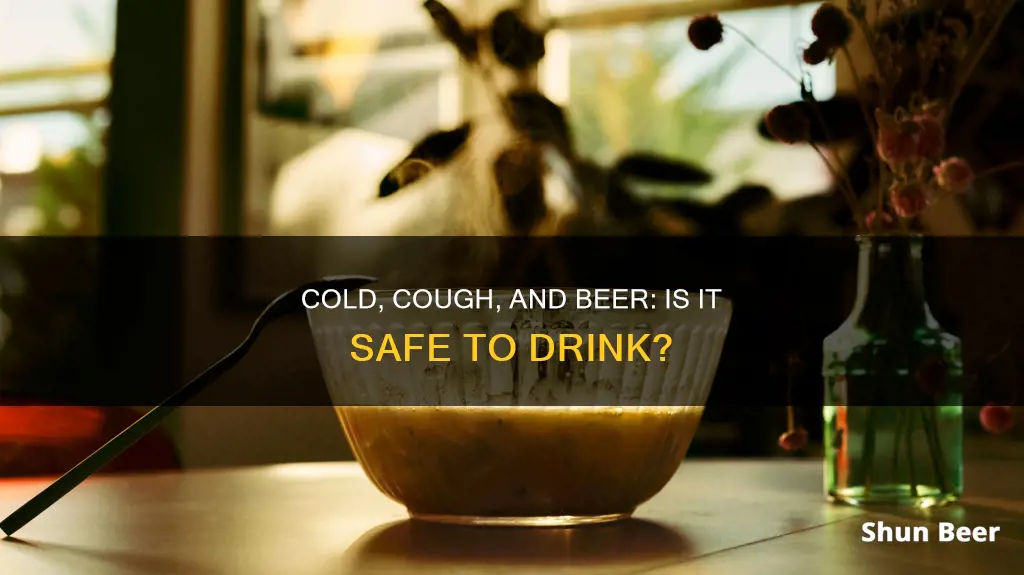
Drinking alcohol when you're sick is generally not recommended by health authorities. Alcohol can weaken your body's ability to fight off infection, making your body more susceptible to getting sick and slowing down recovery. It can also negatively impact your sleep, which is important for feeling better. Additionally, alcohol can cause dehydration, which can worsen congestion. If you're taking any cold medications, alcohol may interact with them, leading to dangerous consequences. However, there is limited evidence suggesting that moderate alcohol consumption may reduce the frequency of colds.
| Characteristics | Values |
|---|---|
| Effect on health | Drinking beer or alcohol may reduce the number of colds per year, but it cannot treat or cure the common cold. |
| Effect on immune system | Alcohol weakens the immune system, making the body more susceptible to getting sick and slowing down recovery. |
| Effect on sleep | Alcohol can interrupt sleep by disrupting REM sleep and activating the alpha activity sleep pattern, which can make cold or flu symptoms worse. |
| Effect on symptoms | Alcohol can worsen common cold and flu symptoms, including headaches, body aches, nausea, vomiting, stomach pain, and fatigue. |
| Effect on dehydration | Alcohol can cause dehydration, which can make congestion worse. |
| Interaction with medication | Alcohol can interact with cold medications such as acetaminophen, chlorpheniramine maleate, pseudoephedrine, and phenylephrine, leading to negative side effects and increased health risks. |
What You'll Learn
- Alcohol may reduce the number of colds per year, but it cannot treat or cure them
- Drinking alcohol while sick can prolong recovery and worsen symptoms
- Alcohol can negatively interact with common cold medications
- Alcohol can cause dehydration, which can make congestion worse
- Health authorities do not recommend drinking alcohol during a cold

Alcohol may reduce the number of colds per year, but it cannot treat or cure them
While there is some evidence that drinking a small amount of alcohol may reduce the number of colds per year, it is not a cure for the common cold. There is no cure for these infections, and health authorities generally do not recommend drinking alcohol during a cold.
Drinking alcohol can weaken the body's ability to fight off infection and slow down recovery. Alcohol can also interrupt your sleep, impairing your sleep in a number of ways. A glass of wine might help you fall asleep, but alcohol is disruptive to getting a good night's rest. It disrupts REM sleep, the most restorative type of sleep, and turns on a sleep pattern called alpha activity, which keeps your body from getting the deep sleep it needs. Not getting enough sleep can make your cold or flu symptoms worse while also prolonging the recovery process.
Alcohol can also worsen common cold and flu symptoms such as headaches, body aches, nausea, vomiting, stomach pain, and fatigue and weakness. It can also cause dehydration, which can make congestion worse.
In addition, alcohol may interact with cold medication. For example, combining alcohol with acetaminophen can cause liver damage, as both are metabolized in the liver. Alcohol can also worsen the side effects of chlorpheniramine maleate, such as drowsiness or nausea. When mixed with pseudoephedrine and phenylephrine, alcohol may cause difficulty sleeping and headaches.
Therefore, while alcohol may reduce the number of colds per year, it cannot treat or cure them. It is best to avoid alcohol when sick and to opt for other treatments such as over-the-counter medications, getting enough rest, drinking fluids, and using saline spray or drops to help with congestion.
Mixing Beer and Wine: A Safe Drinking Adventure?
You may want to see also

Drinking alcohol while sick can prolong recovery and worsen symptoms
Alcohol can also worsen common cold and flu symptoms such as headaches, body aches, nausea, vomiting, and fatigue. It can also cause dehydration, which can further exacerbate congestion. Furthermore, alcohol may interact with certain cold medications, leading to dangerous side effects. For example, combining alcohol with acetaminophen, a common pain reliever and fever reducer found in many cold and flu medications, can cause liver damage.
While there is limited evidence suggesting that moderate alcohol consumption may reduce the frequency of colds, health authorities generally advise against drinking alcohol during illness. Instead, it is recommended to opt for hydrating beverages and get plenty of rest to support the recovery process.
In summary, drinking alcohol while sick can prolong recovery, weaken the immune system, worsen symptoms, and potentially lead to dangerous interactions with medications. It is advisable to abstain from alcohol consumption until full recovery to support the body's natural healing process.
The Science of Beer: Understanding Silos
You may want to see also

Alcohol can negatively interact with common cold medications
Drinking alcohol while taking medication for a cold is not recommended. Alcohol can negatively interact with common cold medications, including over-the-counter and prescription drugs. These interactions can be dangerous and lead to serious health consequences, including overdose and even death.
- Acetaminophen: Acetaminophen is a common pain reliever and fever reducer found in many over-the-counter cold and flu medications. Since both acetaminophen and alcohol are metabolized in the liver, consuming alcohol while taking this medication can lead to liver damage.
- Chlorpheniramine maleate: This antihistamine helps with symptoms like sneezing, a runny nose, and itchy eyes. Alcohol can worsen the side effects of this medication, such as drowsiness and nausea.
- Pseudoephedrine and phenylephrine: These nasal decongestants help clear sinuses but can negatively interact with alcohol. Mixing alcohol with these medications may cause difficulty sleeping and headaches.
- Sleep disruptions: Alcohol can impair your sleep, disrupting REM sleep and activating a sleep pattern called alpha activity, which prevents your body from getting deep sleep. This can make your cold or flu symptoms worse and prolong your recovery.
- Dehydration: Alcohol consumption can lead to dehydration, which can further aggravate congestion.
- Side effects: Mixing alcohol with medication can intensify the side effects of the medication, such as drowsiness, dizziness, impaired judgment, and coordination problems. This can be especially dangerous if you need to drive or operate heavy machinery.
- Underlying health conditions: If you have an underlying health condition, such as heart disease or high blood pressure, mixing alcohol with your medications can put you at risk for complications.
- Blood thinners: Even occasional alcohol consumption can increase the risk of internal bleeding when taking blood thinners.
- Antibiotics: Alcohol may affect how well some antibiotic medications work, and combining the two has been associated with symptoms such as a rapid heartbeat, gastrointestinal upset, headaches, and liver damage.
It is important to carefully read the labels on your medications and consult your doctor or pharmacist before consuming alcohol while taking any medication. The absence of a warning on the label does not necessarily mean it is safe to mix alcohol with that particular drug.
Flat Beer: Is It Safe to Drink?
You may want to see also

Alcohol can cause dehydration, which can make congestion worse
While some people believe that drinking a small amount of alcohol may reduce the number of colds they get per year, health authorities generally do not recommend drinking alcohol during a cold. This is because alcohol can cause dehydration, which can make congestion worse.
Drinking alcohol can weaken your body's ability to fight off infection, making your body more susceptible to getting sick and slowing down recovery. Alcohol also interrupts your sleep, which is important for your body to recover from sickness.
In addition, alcohol can worsen common cold and flu symptoms such as headaches, body aches, nausea, and fatigue. This is because many of these symptoms overlap with those of a hangover.
Furthermore, alcohol can interact with common cold medications such as acetaminophen, chlorpheniramine maleate, and pseudoephedrine, making the combination of alcohol and these medications dangerous.
While it is generally not recommended to drink alcohol while sick, some people claim that alcohol can act as a decongestant. Alcohol dilates the blood vessels, making it easier for the mucus membranes to deal with the infection. However, it is important to note that alcohol is a toxic substance that can have negative effects on the body, and it should not be relied upon as a treatment for congestion.
Beer and Flucloxacillin: Is It Safe to Mix?
You may want to see also

Health authorities do not recommend drinking alcohol during a cold
Drinking alcohol can weaken the body's ability to fight off infection and slow down recovery. Alcohol impairs the immune system, making it harder for the body to recover from illness. It can also cause dehydration, which can make congestion worse. In addition, alcohol can interact dangerously with over-the-counter and prescription medications, including common cold medications such as acetaminophen, chlorpheniramine maleate, pseudoephedrine, and phenylephrine. These interactions can lead to increased side effects, such as dizziness, drowsiness, impaired coordination, and difficulty concentrating.
Alcohol can also worsen common cold and flu symptoms, including headaches, body aches, nausea, vomiting, and fatigue. It disrupts REM sleep, the most restorative type of sleep, which can leave you feeling groggy and worsen your symptoms.
Instead of alcohol, it is recommended to opt for hydrating beverages and over-the-counter treatments or home remedies to relieve cold symptoms. Getting enough rest, drinking fluids, and using saline spray or drops can help manage symptoms until they subside.
Beer, Anxiety, and You: A Curious Concoction
You may want to see also
Frequently asked questions
While there is some evidence that drinking a small amount of alcohol may reduce the number of colds per year, health authorities generally do not recommend drinking alcohol during a cold. Alcohol can weaken the body's ability to fight off infection and can prolong recovery.
Alcohol has different effects on the immune system depending on the amount consumed. Long-term alcohol use can make a person 3-7 times more susceptible to viral and bacterial infections, including colds. However, moderate alcohol consumption may decrease the number of colds people get overall by influencing aspects of the immune response.
Alcohol is known to disrupt REM sleep, the most restorative type of sleep, which can leave you feeling groggy in the morning. It also turns on a sleep pattern called alpha activity, which prevents your body from getting the deep sleep it needs to recover from sickness.
No, it is not recommended to mix alcohol with cold medication. Alcohol can interact with some over-the-counter and prescription medications, such as acetaminophen, chlorpheniramine maleate, pseudoephedrine, and phenylephrine, leading to dangerous side effects.
There is limited evidence that the hops in beer contain a chemical compound called humulone, which can help the body fight the virus that causes the common cold. However, a single can of beer does not contain enough humulone to make a difference. Beer has also been shown to increase bone density and reduce the risk of heart disease, Alzheimer's, and other types of dementia.







